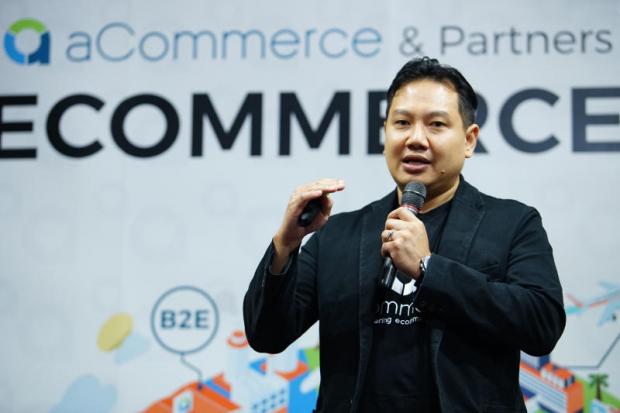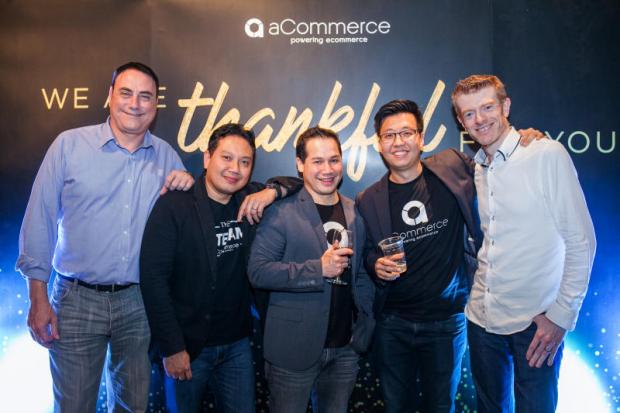
ACommerce Thailand co-chief executive Tom Srivorakul grew up in the US and has always been fascinated by internet business models. He worked in various industries and returned to Thailand over 15 years ago to start his first internet business with his two brothers. Over the years, Mr Tom and his brothers have built and exited various regional businesses. Here he offers his views on the state of e-commerce in Thailand.
Q: What was the inspiration for your e-commerce businesses, Ensogo and aCommerce?
After seeing the Groupon phenomenon in the US, we started Ensogo in Thailand, Indonesia and the Philippines. ACommerce's business was conceptualised after we exited Ensogo and during our time at Ardent Capital when we invested in a few startups in the e-commerce space. We saw that local and regional e-commerce companies faced logistics challenges in fulfilling and delivering products to customers. There were very few providers of efficient and cost-effective B2C (business-to-customer) fulfilment and logistics for e-commerce.
Logistics was where we started at the beginning, before we pivoted to offer end-to-end e-commerce solutions. Today aCommerce provides consulting, distribution and retailing, marketing, e-store development and management, customer service, warehousing, order fulfilment, and delivery. We simply transformed from a DHL-type business to include Accenture, IBM, WPP and more within a few months.
We are passionate about disrupting the traditional commerce landscape and being a part of the many innovations still to come.
Q: How do you view the evolution of local e-commerce in the past decade?
E-commerce in Thailand grew really quickly, like in many regions of Southeast Asia. Less than 10 years ago, e-commerce was almost unknown in Asia. It's really driven by the consumer's digital behaviour, influenced by various technologies. The growth across the entire digital sector is just astounding and will evolve rapidly in the years ahead. Companies in Southeast Asia can see what's happening in other parts of the world and realise that e-commerce helps them remain competitive. Any company who wants to directly engage a consumer to effectively "try or buy" something must find a way to participate in e-commerce.
There are many strategic interests and massive investments focused on growing e-commerce in our region. Awesome growth of smartphone penetration is driving consumers to interact with digital content and media, which influences e-commerce transactions. Consumers are discovering many new online-first brands who are taking advantage of the lower barriers and costs via e-commerce. It's just so damn exciting to see this digital industry evolve at such a rapid pace.
Q: How do you manage a startup for growth and success?
I can't emphasise enough that the most important aspect to every business is having the right people in your organisation. At the end of the day, even the best technology cannot replace passionate human talent. We really emphasise that working together as a team will build us a better and bigger company for everyone involved.

Mr Tom (second left) with fellow executives of aCommerce Thailand.
I wouldn't have been able to achieve my goals to grow our company if not for my many great colleagues, especially Khun Phensiri "Care" Sathianvongnusar, co-CEO for aCommerce Thailand. She was instrumental in creating aCommerce since day one, and we strive to make aCommerce Thailand the best example for our group.
Q: As a company operating in Southeast Asia, how do you manage the diversity of people and businesses?
We've been fortunate to have built many previous businesses across the region. The founders and executives have vast experience across many industries and countries. But it's never easy because of the various local cultures and challenging infrastructure. As we become an enterprise-level business with over 1,500 team members, we try to implement uniformity of company culture, standard operating process, and core technologies where we can.
However, it's critical to have each country be autonomous in creating opportunities and fostering their own growth. We rely on the great leadership in each country to balance both an entrepreneurial and corporate approach. Thailand is the company headquarters, so we are proud there's a lot of "best practice" that happens here.
Q: What is the biggest challenge you have faced and how did you overcome it?
One of the challenges we faced was pivoting from being an e-commerce logistics provider to becoming a full end-to-end e-commerce solutions provider. There was no one in Thailand doing it, and we had to learn and develop the business model ourselves. Fortunately we had great people who took the challenge, and many of them have become respected experts in our industry. Many opportunities and challenging moments have made us all stronger and battle-tested.
We also realised that our new business model would make us first-movers in a region relatively new to e-commerce. Speed is an important factor in this competition, so we set up infrastructure, technology and platforms, as well as the marketing budget we had to spend to educate the markets. ACommerce was always driven by the needs of our clients to solve their many pain points in executing their e-commerce initiatives in Thailand and across Southeast Asia.
Q: How do you see local e-commerce market in 2018-19?
It is apparent to the world how China has transformed itself over the last 10 years, especially in e-commerce, which was driven by aggressive internet companies like Alibaba and Tencent. Southeast Asia, being one of the largest emerging markets in the world, is learning and adapting from the success in China and elsewhere. Lazada continues to grow strong and benefit from their first-mover advantage after the acquisition by Alibaba. JD.com, Shopee and other local players are also benefiting from the big investments stimulating e-commerce growth in our region.
We have seen in recent years that more brands are increasing their online presence via a direct-to-consumer strategy. Many of our clients who now have some e-commerce experience are looking to develop omnichannel or bridging both online and offline commerce to benefit their consumers.
We also see B2B e-commerce growth as brands utilise the efficiency of e-commerce technology and process to improve selling to other businesses. Brands have seen the benefits of how technology and process can effectively disrupt traditional B2B commerce, which hasn't evolved much in many years. Globally, B2B e-commerce already exists with Alibaba's Taobao platform as a successful example. The B2B e-commerce industry is much larger than B2C e-commerce, and we are excited to support this growth in the region.
Q: Tell us your milestone of success.
ACommerce was founded by my two brothers; Piers Bennett, our group CFO and long-time partner; Peter Kopitz, our group COO; Sheji Ho, our group CMO; and myself in May 2013. Having secured $10.7 million in Series A funding in 2014, the company was able to expand abroad and serve 100-plus clients with over 500 team members in its first year.

The working philosophy is put at aCommerce office.
In 2017, aCommerce operated in Thailand, Indonesia, Singapore and the Philippines. With over 1,400 team members serving over 200 clients across the region, the company managed over 4 million orders via proprietary technology supported by 11 warehouses and hubs.
Q: What is your next ambitious goal and key success factor?
My ambition is to influence the growth of the digital industry in Thailand and across Southeast Asia. A key measure of success for me is to see team members I have worked with become industry leaders themselves. I truly enjoy knowing they are building their own businesses and further influencing the growth of our industry.
Q: What do you do in your leisure time?
I spend a lot of my time growing the business and try very hard to balance my family life. My family is the backbone of my existence, and I'm also committed to advancing the success of future generations. I'm very involved in raising my three boys together with my wife. Whenever I'm home during the week, I help with homework and we catch up on our daily activities during dinner and our favourite shows. On weekends, I'm the chauffeur taking the kids to various activities and sports events. I'm on a mission to get more fit and find the energy to keep up with my kids. I'm also artistic and try to paint or sketch whenever I can to centre myself. My brothers' families, my parents and my family are always close and have Sunday dinners together. I'm also my dad's personal barber, and I enjoy giving him a proper shave and cut every Saturday. He's 92 years old and strong as a bull and a great influence on my life, especially the grandchildren.
Q: Any suggestions for present-day local startups?
Having operated some internet businesses in the past years, and as strange as it sounds, I would recommend entrepreneurs to fail fast and move fast. Being able to experience failure during the early stage enables you to react and pivot immediately.
Co-founders must be aware of the growth phases of their business. Know what the goal line looks like and plan the business toward it. Are you building the business for dividends or an acquisition? An IPO is a lofty goal and can only be realised in the later stages and requires tremendous prep work.
Depending on your business goals, always be active in fundraising to expand the business. The best investors provide great advice and strong network to leverage and grow. This part is easier said than done and may require talking to many investors to find the best fit.
